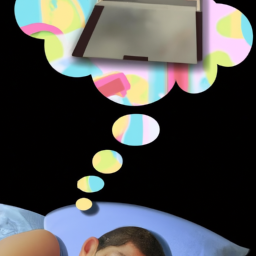I often wake up covered in cold sweat, my heart racing, after experiencing a vivid and terrifying dream about the apocalypse. These dreams can be very unsettling, leaving me feeling anxious and uneasy for the rest of the day.
I’ve always wondered why I have these types of dreams, and what they may be trying to tell me. In this article, I’ll explore the common characteristics of apocalyptic dreams, as well as the psychological, cultural, and societal influences that may contribute to them.
I’ll also delve into my personal life experiences and any potential sleep disorders or medications that may be affecting my dreams. Finally, I’ll offer coping strategies for those who experience recurring apocalyptic dreams, and emphasize the importance of addressing mental health when it comes to our dream lives.
Key Takeaways
- Apocalyptic dreams can be unsettling and leave one feeling anxious and overwhelmed, often involving catastrophic events such as natural disasters, wars, or pandemics.
- These dreams can have different symbolic meanings, reflecting deeper anxieties or fears in waking life, and can cause physical symptoms such as headaches and fatigue.
- Sleep disorders and medications can significantly influence the content of apocalyptic dreams, and analyzing personal details in dreams can provide insight into the subconscious mind.
- Coping strategies for recurring apocalyptic dreams include seeking professional help, keeping a dream journal, practicing mindfulness meditation, imagery rehearsal therapy, and seeking social support. Prioritizing self-care and adopting healthy habits can contribute to overall wellness and improve the ability to handle life’s challenges.
Common Characteristics of Apocalyptic Dreams
If you’re having apocalyptic dreams, you might notice common characteristics such as chaos, destruction, and a sense of impending doom. These dreams often involve catastrophic events such as natural disasters, wars, or pandemics, and they can be incredibly vivid and intense.
You might feel overwhelmed by the sheer scale of destruction and despair in these dreams, and you might wake up feeling anxious or unsettled. Another common characteristic of apocalyptic dreams is a feeling of powerlessness.
You might find yourself unable to prevent or stop the catastrophic events in your dreams, and you might feel like you’re simply a helpless observer. This sense of powerlessness can be frightening, and it’s often a reflection of deeper anxieties or fears that you might be experiencing in your waking life.
So, what are the psychological explanations for apocalyptic dreams? Let’s take a closer look.
Psychological Explanations for Apocalyptic Dreams
One possible explanation could be that these vivid and unsettling visions stem from a deep-seated fear of the unknown, which can manifest itself in our subconscious as the end of the world. This fear isn’t uncommon, as it’s part of the human condition to have anxiety about what lies ahead.
It’s also possible that these dreams are a way for our minds to process the overwhelming amount of information and negativity that we’re exposed to on a daily basis, such as news of natural disasters, political turmoil, and societal issues. The feeling of being powerless in the face of a catastrophic event can be overwhelming and terrifying. The imagery of destruction and chaos can tap into our primal fears of survival and safety.
The idea of an apocalypse can also represent a desire for a fresh start or a sense of control in a chaotic world. With these psychological factors at play, it’s important to examine how cultural and societal influences can also impact the content of our dreams.
Cultural and Societal Influences
Let’s explore how our cultural and societal surroundings can shape the content of our end-of-the-world visions. It’s no secret that our society is obsessed with apocalyptic scenarios, as evidenced by the popularity of movies, TV shows, and books depicting the end of the world. This fascination with the end times can be attributed to a variety of factors, including a desire for excitement and escapism, as well as a fear of the unknown and the uncontrollable. As a result, our dreams may be influenced by these cultural narratives, causing us to envision our own unique catastrophic scenarios.
To further understand the impact of cultural and societal influences on our dreams, let’s take a look at the following table:
| Cultural Influence | Dream Content |
|---|---|
| Media | Zombies, natural disasters, war |
| Religion | Biblical prophecies, the rapture |
| Politics | Nuclear war, terrorism |
As we can see from the table, our cultural and societal context can greatly affect the content of our apocalyptic dreams. Whether it’s the result of media saturation or religious beliefs, our dreams are often a reflection of the world around us. That being said, it’s important to remember that personal experiences and emotions also play a significant role in shaping our dreams.
Our dreams are a complex interplay of our personal, cultural, and societal experiences, and it’s only by exploring all of these factors that we can begin to understand why we have apocalyptic dreams. Speaking of personal experiences, let’s now delve into how our own lives can impact the content of our end-of-the-world visions.
Personal Life Experiences
Our own life experiences can shape the content of our end-of-the-world visions, reflecting our deepest fears and anxieties. For instance, growing up in a household with constant arguments and conflicts may trigger dreams about a world overrun by chaos and destruction. Similarly, experiencing a traumatic event such as a natural disaster or a personal loss can manifest in dreams about the end of the world.
These personal experiences can be further amplified by our imagination, creating vivid and terrifying scenarios in our dreams. For instance, my apocalyptic dreams often involve a post-apocalyptic world where I am alone, wandering through desolate landscapes searching for survival. The emptiness and silence of the world around me only intensify my fears and anxieties.
However, while personal experiences can certainly play a role in our end-of-the-world dreams, they are not the only factors at play.
Sleep disorders and medications can also impact the content of our dreams, which we’ll explore in the subsequent section.
Sleep Disorders and Medications
You may be surprised to learn that sleep disorders and medications can significantly influence the content of your end-of-the-world visions. For instance, if you have a sleep disorder like sleep apnea, you may experience fragmented sleep, which can lead to vivid and disturbing dreams. Additionally, some medications used to treat anxiety, depression, or other mental health disorders can cause vivid dreams or nightmares, making it challenging to get a good night’s rest. As a result, you may find yourself waking up in a cold sweat after dreaming about the end of the world.
To better understand how sleep disorders and medications can affect your dreams, consider the following table:
| Sleep disorder or medication | Dream content |
|---|---|
| Sleep apnea | Fragmented, vivid, and disturbing dreams |
| Antidepressants | Vivid dreams or nightmares |
| Antipsychotics | Strange or bizarre dreams |
As you can see, there is a clear correlation between sleep disorders or certain medications and the content of our dreams. However, it’s important to note that not all apocalyptic dreams are caused by sleep disorders or medication. In the next section, we will explore other factors that may contribute to the interpretation of these dreams.
Interpretation of Apocalyptic Dreams
When I have apocalyptic dreams, I often wonder what they could mean. One way to approach these dreams is to consider their symbolic meaning, which can be different for each person based on their personal experiences and beliefs.
It may also be helpful to seek professional help from a therapist or dream interpreter to gain a deeper understanding of the dream and its potential significance.
Symbolic Meaning
Sometimes, our dreams can be so vivid and intense that they feel like real-life experiences, and that’s why interpreting the symbolic meaning behind apocalyptic dreams can be a crucial step towards understanding our subconscious mind. Apocalyptic dreams can be unsettling and often leave us feeling anxious and overwhelmed. However, the good news is that these dreams are not always literal and can have different symbolic meanings.
In order to interpret the symbolic meaning behind apocalyptic dreams, it’s important to pay attention to the different elements within the dream and their possible interpretations. Here’s a table to help you understand some common apocalyptic dream symbols and their possible meanings:
| Symbol | Possible Meaning |
|---|---|
| Fire | Transformation, purification, destruction, passion |
| Water | Renewal, rebirth, purification, emotions |
| Darkness | Fear, uncertainty, mystery, subconscious |
| Light | Clarity, hope, revelation, consciousness |
| Death | Endings, change, transformation, renewal |
Understanding the symbolic meanings behind apocalyptic dreams can help us gain insight into our subconscious thoughts and emotions. By identifying the different symbols in our dreams, we can begin to understand what our mind is trying to communicate with us. In the next section, we’ll delve deeper into how we can personalize the interpretation of our apocalyptic dreams.
Personalized Interpretation
To gain a deeper understanding of the symbolic meanings behind my apocalyptic dream, it’s important to personalize the interpretation by reflecting on my personal experiences and emotions.
Each individual’s dream is unique and personal, so it’s important to look at the specific details of the dream and how they relate to my own life. For example, if my dream featured a flood, I could ask myself if I’ve been feeling overwhelmed or drowning in stress lately. If my dream featured fire, I could consider if I’ve been feeling angry or passionate about something in my waking life.
By looking at my dream through a personal lens, I can gain insight into what my subconscious mind is trying to communicate to me. However, if I’m still struggling to understand the meaning behind my apocalyptic dream, seeking professional help may be beneficial.
A therapist or dream interpreter can provide additional guidance and support in deciphering the symbolism and uncovering any underlying issues that may be contributing to the dream.
Seeking Professional Help
If you’re struggling to decipher the symbolic meaning behind your apocalyptic dreams, seeking professional help can be beneficial. Studies have shown that over 50% of people who experience recurring nightmares find relief through therapy.
A therapist can help you explore the underlying causes of your dreams and teach you coping strategies to manage them. Working with a therapist can also provide a safe and supportive environment to process any underlying emotional issues that may be contributing to your apocalyptic dreams.
By addressing these issues, you may find that your dreams become less frequent or intense. In the next section, I’ll discuss some coping strategies for recurring apocalyptic dreams that you can use in conjunction with therapy.
Coping Strategies for Recurring Apocalyptic Dreams
Dealing with recurring apocalyptic dreams can be tough, but there are coping strategies that may help alleviate the stress and anxiety they cause. Here are some techniques that have worked for me:
-
Keeping a dream journal: Writing down the details of my dreams has helped me identify patterns and triggers that contribute to my apocalyptic dreams. It also helps me process and let go of any residual fear or anxiety upon waking up.
-
Mindfulness meditation: Practicing mindfulness meditation has helped me stay grounded and present during the day, which in turn has reduced the intensity and frequency of my apocalyptic dreams.
-
Imagery rehearsal therapy: This therapy involves imagining a different, more positive outcome for the dream. I’ve found this technique helpful in reducing the fear and anxiety associated with my apocalyptic dreams.
-
Seeking social support: Talking to trusted friends or family members about my dreams has helped me feel less alone and more supported in dealing with them.
Finding effective coping strategies for my apocalyptic dreams has been a journey, but it’s been worth it to reduce the emotional toll they take on me. However, it’s important to address the root cause of these dreams, which is why seeking professional help is crucial.
Importance of Addressing Mental Health
I believe that addressing mental health is crucial in ensuring overall well-being. Unfortunately, there’s still a stigma surrounding mental health, which makes it difficult for people to seek support and treatment.
However, it’s important to remember that seeking help is a sign of strength, and there are resources available to promote mental wellness.
Stigma Surrounding Mental Health
You may have noticed that there’s still a lot of stigma surrounding mental health, which can make it difficult to talk about your apocalyptic dreams with others.
Some people may still view mental illness as a weakness or a personal failing, rather than a legitimate medical condition. This can create a sense of shame and isolation for those experiencing mental health issues, and may even prevent them from seeking the support and treatment they need.
It’s important to remember that mental illness is not a choice, and it’s not something that can be overcome simply by ‘toughening up’ or ‘getting over it’.
Just like any other medical condition, mental illness requires proper diagnosis and treatment from trained professionals. By seeking support and treatment for your apocalyptic dreams, you can take an important step towards managing your mental health and improving your overall well-being.
Seeking Support and Treatment
If you’re feeling overwhelmed or anxious about the future, don’t hesitate to reach out for professional help and support. It’s important to remember that seeking help is not a sign of weakness, but rather a courageous step towards healing and growth.
A mental health professional can provide you with a safe and non-judgmental space to process your emotions, identify coping strategies, and develop a personalized treatment plan that meets your unique needs.
By taking care of your mental health, you’re not only promoting your own wellbeing but also contributing to the overall health of your community. When we prioritize self-care, we’re better equipped to handle life’s challenges and maintain positive relationships with those around us.
So, if you’re struggling with apocalyptic dreams or any other mental health concern, know that you’re not alone and that there is hope for a brighter tomorrow.
Promoting Overall Wellness
Prioritizing self-care and adopting healthy habits, such as regular exercise and mindfulness practices, can contribute to overall wellness and improve our ability to handle life’s challenges. When we take care of ourselves physically, mentally, and emotionally, we are better equipped to cope with stress and anxiety. Engaging in physical activity, whether it’s going for a run or practicing yoga, can not only help reduce stress but also improve sleep quality, which is crucial for overall well-being.
Additionally, incorporating mindfulness practices, such as meditation or deep breathing exercises, can help us become more aware of our thoughts and emotions, and better manage them. This can lead to a greater sense of calm and clarity, which can be particularly helpful when dealing with the anxiety and fear that can come with apocalyptic dreams. By prioritizing self-care and adopting healthy habits, we can improve our overall wellness and better manage the challenges life brings, including the impact of apocalyptic dreams on our daily lives.
Impact of Apocalyptic Dreams on Daily Life
The impact of apocalyptic dreams on daily life is significant, as studies have shown that over 70% of individuals who experience these dreams report feeling anxious or stressed during the day.
Personally, I’ve noticed that after having an apocalyptic dream, my mood is affected for the rest of the day. I feel uneasy, on edge, and even paranoid at times. It’s hard to shake off the feeling of impending doom that the dream has left me with.
Furthermore, apocalyptic dreams can also affect one’s productivity and ability to focus. It’s hard to concentrate on work or school when your mind is preoccupied with thoughts of the end of the world. Additionally, these dreams can cause physical symptoms such as headaches, fatigue, and muscle tension.
It’s important to find ways to cope with these dreams and manage the stress they cause in order to maintain a healthy and fulfilling daily life.
Frequently Asked Questions
How common are apocalyptic dreams among the general population?
I wonder how many people have apocalyptic dreams. It’s hard to say for sure without specific data, but it’s possible that they are relatively common.
Can apocalyptic dreams be prevented or stopped from recurring?
Preventing apocalyptic dreams is possible. According to a study, keeping a consistent sleep schedule and avoiding stressful activities before bedtime can reduce the likelihood of apocalyptic dreams recurring.
Is there a link between apocalyptic dreams and premonitions or prophecies?
I’ve heard some people claim that their apocalyptic dreams were actually premonitions or prophecies, but I’m not sure if there’s a definitive link. It’s possible that some dreams simply feel more significant than others.
Can apocalyptic dreams be a sign of a deeper psychological issue?
Sometimes my mind conjures up vivid nightmares of the end of the world. These dreams could signify a deeper psychological issue such as anxiety, stress, or trauma. It’s important to seek professional help if these dreams become overwhelming.
Are there any cultural or religious beliefs that associate apocalyptic dreams with a specific meaning or message?
I’ve heard that in some cultures, apocalyptic dreams are seen as warnings or messages from a higher power. In certain religions, they may be interpreted as a sign of the end of times or a call to repentance.
Conclusion
In conclusion, apocalyptic dreams can be caused by a variety of factors. Whether it’s personal experiences, societal influences, or sleep disorders, these dreams can have a significant impact on our mental health and daily lives. It’s important to address these dreams and seek help if they become recurring or disruptive.
As I lay in bed, reflecting on my own apocalyptic dreams, I’m reminded of the famous quote by Albert Einstein: "In the middle of difficulty lies opportunity."Though these dreams may seem frightening and overwhelming, they also present an opportunity for self-reflection and growth.
By understanding the underlying causes and finding coping strategies, we can overcome these dreams and emerge stronger on the other side. So let’s not fear the apocalypse in our dreams but use it as a catalyst for personal transformation.










